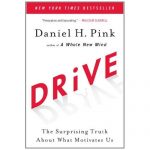 One of the books on my summer reading list was Daniel Pink’s Drive: The Surprising Truth About What Motivates Us. Pink’s basic premise is that the personnel management philosophies, practices, and systems that are at work in most organizations are outdated and ineffective. This inadequate model, which Pink refers to as “Motivation 2.0,” works on a carrot and stick approach. It assumes that extrinsic rewards (and punishments) are needed to get people to do their jobs.
Pink draws on a wide array of research from social sciences to argue that a different mindset, Motivation 3.0, is needed to get the best out of workers in most jobs today. Scientific studies have shown that the use of extrinsic rewards actually undermines a person’s intrinsic motivation. But if we want staff members to be creative, motivated, dedicated, self-starters, intrinsic motivation is essential. According to Pink, the three keys to Motivation 3.0 are autonomy, mastery, and purpose, not rewards or threats.
Do you tend to use Motivation 2.0 in your management? At first glance, you may think not, but as I read Drive, I kept thinking of examples from my experience and from others that I’ve observed. The old carrot and stick mindset is deeply entrenched in much of what we do. If you want someone to do something, how often do they hear, “If you do this, then ____ (reward)” or “If you don’t do this, then ____ (punishment)”? Give this question some thought this week and see if you need to reconsider your assumptions about what drives others and what this means for you as a leader.
It’s easy to receive my blogs by email. Just sign-up on Feedburner by clicking here.]]>
One of the books on my summer reading list was Daniel Pink’s Drive: The Surprising Truth About What Motivates Us. Pink’s basic premise is that the personnel management philosophies, practices, and systems that are at work in most organizations are outdated and ineffective. This inadequate model, which Pink refers to as “Motivation 2.0,” works on a carrot and stick approach. It assumes that extrinsic rewards (and punishments) are needed to get people to do their jobs.
Pink draws on a wide array of research from social sciences to argue that a different mindset, Motivation 3.0, is needed to get the best out of workers in most jobs today. Scientific studies have shown that the use of extrinsic rewards actually undermines a person’s intrinsic motivation. But if we want staff members to be creative, motivated, dedicated, self-starters, intrinsic motivation is essential. According to Pink, the three keys to Motivation 3.0 are autonomy, mastery, and purpose, not rewards or threats.
Do you tend to use Motivation 2.0 in your management? At first glance, you may think not, but as I read Drive, I kept thinking of examples from my experience and from others that I’ve observed. The old carrot and stick mindset is deeply entrenched in much of what we do. If you want someone to do something, how often do they hear, “If you do this, then ____ (reward)” or “If you don’t do this, then ____ (punishment)”? Give this question some thought this week and see if you need to reconsider your assumptions about what drives others and what this means for you as a leader.
It’s easy to receive my blogs by email. Just sign-up on Feedburner by clicking here.]]>



